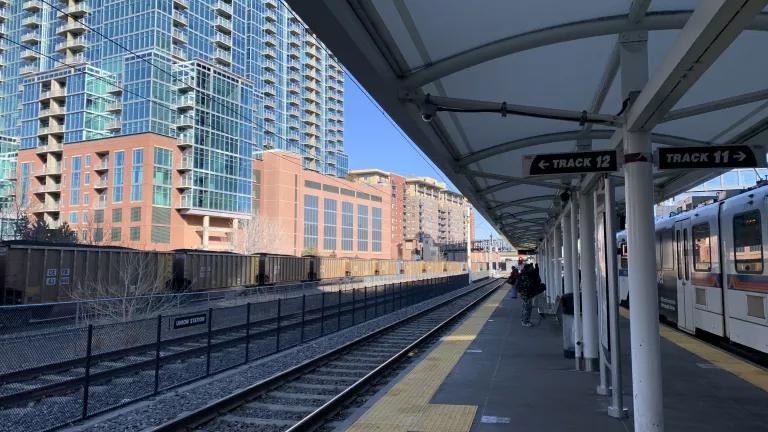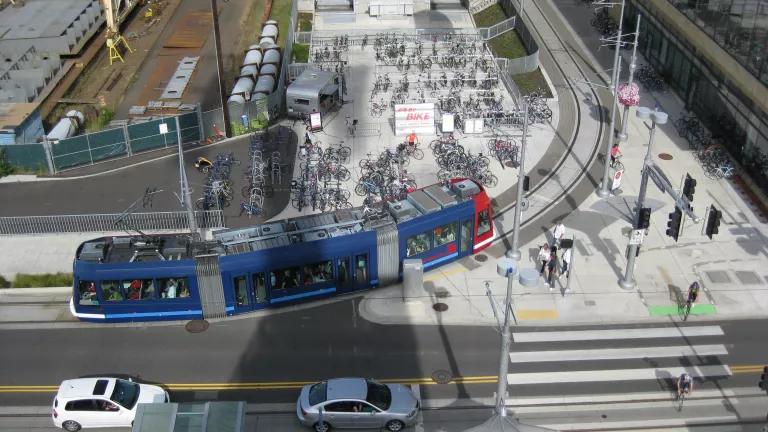Scooting Toward a More Sustainable and Equitable Mobility

If you live in one of dozens of American cities, you’ve probably seen fleets of “dockless” scooters and bikes offering quick trips for a couple bucks.
Small shared vehicles, running on human power or small electric motors, offer promising path to increasing mobility while shifting more trips out of private cars—an essential task for achieving our climate change goals.
The emergence of private, for-profit shared scooters and bikes presents interesting challenges for public agencies to ensure that these services are deployed in a way that complements existing public transit, as well as efforts to increase street safety, improve mobility for underserved communities and reduce vehicle-miles traveled.
It’s a complicated task for city governments that are often juggling multiple competing priorities.
With that in mind, NRDC joins some of our staunchest allies in creating healthy, sustainable and equitable cities to issue the following letter. Our goal? To drive greater focus on our core transportation values as governments take action to regulate and organize these new mobility choices into the existing landscape of urban movement.
To Whom It May Concern,
We, the undersigned transportation, environmental, and equity groups, support opportunities to increase mobility in our communities. We strive to create safe, healthy, walkable, bikeable, and welcoming urban environments. We also encourage the use of public transportation in order to reduce greenhouse gas emissions and criteria air pollutants that impact our environment and air quality. Private companies operating shared, electric, and accessible mobility devices should integrate with and complement public transit, promote the most sustainable and affordable modes, improve safety for cyclists and pedestrians, and ensure universal access and choice.
We believe that new mobility modes like electric scooters and electric bikes can significantly reduce greenhouse gas emissions from the transportation sector and improve mobility for those with very limited options if they are guided by a strong commitment to supporting equity and existing public transit. We encourage municipalities to embrace these new modes of mobility and we ask that you consider these principles when developing ordinances, pilot programs, RFA/RFPs, or in awarding contracts or permits to companies to operate in the public right of way for any first/last mile solutions through shared mobility services—specifically electric bicycles and electric scooters. These principles build off of the foundational Shared Mobility Principles for Livable Cities.
- Enable mobility services that are shared, electric and accessible, integrated with and complementing public transit.
- Prioritize reducing car ownership, vehicle miles traveled, emissions and traffic by including non-vehicular modes in mobile apps and encouraging multi-modal, shared-ride, and public options for mobility.
- Focus on equity by ensuring services are accessible for families, people with disabilities, communities of color, low-income communities, older adults, people with language barriers, and others with special needs.
- Commit to geographic, socio-economic and racial equity to ensure that all residents have access to these mobility options, particularly those in transit poor neighborhoods.
- Commit to the safety of users and the public as a whole, by working with users to obey all applicable State laws and City ordinances, including minimum age limits, and by working to ensure that devices don’t block sidewalks, curb ramps, ADA access, and doorways.
- Conduct outreach and user education around safe operating speeds and tips for sharing the public right of way to ensure public safety and reduce information barriers. Use operations fees to fund outreach and education, and partner with community based organizations to conduct such activities when feasible.
- Support complete streets and Vision Zero policies that prioritize safe and efficient use of street space. Work to create drop zones for dockless devices either by reimagining curbside parking for more than just automobiles or by establishing bike corral and dockless parking areas in “furniture zones” (the section of sidewalk between the curb and the pedestrian) where street furniture, lighting, benches, utility poles, tree pits, bicycle/scooter racks can live, or similar strategies to ensure pedestrian safety.
- Require operators to provide durable products that are well-maintained and long-lasting, ensuring reliability of service and reducing negative environmental impacts.
- Use “geo-fencing” and shared mobility drop zones to cluster shared mobility with major transit stations and community destinations.
- Expand roadway infrastructure that supports safe walking, biking and scooting, such as protected bike lanes, on-street parking corrals, and high visibility crosswalks.
- Require operators to collect and share open data in standard formats to inform program evaluation and future planning.
- Protect against monopolistic business practices by ensuring competitive franchise arrangements so costs remain affordable.
Yours sincerely,
Eli Lipmen
Move LA
Carter Rubin
Mobility and Climate Advocate
Natural Resources Defense Council
Río Oxas
Policy & Programs Organizer
People for Mobility Justice
Emilia Crotty
Executive Director
LA Walks
Helen Leung
Co-Executive Director
LA-Más
Lyndsey Nolan
Policy Director
LA County Bicycle Coalition
Hilary Norton
Executive Director
FAST - Fixing Angelenos Stuck in Traffic
Jessica Meaney
Executive Director
Investing in Place
Wesley Reutimann
Executive Director
Bike San Gabriel Valley
Bryn Lindblad
Associate Director
Climate Resolve




